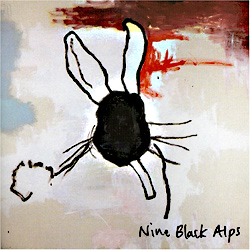NINE BLACK ALPS
Everything Is
(Island)
Now that indie rock’s apparent purpose is to make the last 20 years of music sound worse than it really was, the only fun to be had is in finding obscurities bad enough to bury what’s left of the canon. Did cock-rockers Sonic Youth need so many different guitars that sounded the same? Were all songs titled “Unsatisfied” just (only?) unsatisfying? Do vague shoegazer album titles mean Ride and My Bloody Valentine created deathless epics of eroticized passivity, or did they just (only?) belong at the bottom (top?) of old Lollapalooza bills like everybody else? Should bands be allowed to use the word “black” in their name if none of the members were in the Brian Jonestown Massacre? Has this band been dropped by Island already? (Dunno, maybe on purpose, going blank again, maybe accidentally, RIP Creation.) The shortest track from this Manchester, U.K., band’s debut (“Just Friends,” 2:15) has the best riffs and most complicated structure; the next shortest (“Everybody Is,” 2:37) has a “noise solo” too rote and perfunctory to explain the song/album titular discrepancy; and all 3:35 of the imposing “Southern Cross” seems like a cursory nod to the “Death Valley ’69” end of Amerindie that got buried among the Carpenters and Cheap Trick tributes. What “Get Your Guns” and “Shot Down” speeding up “Blew” and “That Smell” means is that for English kids who hang around skate parks feeling persecuted, the Foo Fighters were the Zeppelin to Nirvana’s Yardbirds, and the “sci-fi” explanation of the cover art of the Foos’ debut got lost in translation crossing the Atlantic. DAVE QUEEN
Nine Black Alps play with Silver Sun Pickups at Neumo’s, 925 E. Pike St., 206-709-9467, www.neumos.com. $11. 8 p.m. Thurs., March 9.
VARIOUS ARTISTS
Cult Cargo: Belize City Boil Up
(The Numero Group)
The two other albums I’ve checked out from this Chicago reissue label’s lovingly designed catalog of obscurities have been underwhelming: Yellow Pills (1978–82 power pop, zzzzz) and Eccentric Soul: The Bandit Label, whose title descriptor is wishful (try “inept,” or better and more marketable yet, “outsider”) and whose music best serves as the soundtrack to a bizarre backstory told best by Bob Mehr in the April 22, 2005, Chicago Reader. But this comp of 1970s calypso, reggae, and especially R&B from the small South American country of Belize sticks, especially when the tempos speed up, which is often. Blaxploitation-ready originals like Soul Creation’s two-part “Funky Jive” and Lord Rhaburn’s “Disco Connection” are as mouthwatering as their titles indicate, but the covers are what you’ll wow your friends with. The Professionals reggae up the O’Jays’ “Back Stabbers” and lose the verses in the process, but the real prize is the Harmonettes’ “Shame, Shame, Shame.” The liner notes call it a rawer funk version of Shirley (and Company)’s “slick” disco hit, which is precisely backward—the remake sounds far more pro (the groove is about halfway between the original and Bohannon’s slip-sliding “Let’s Start the Dance”), which just enhances things. Weirdly, so does the fact that the group aggressively misheard at least a third of the lyrics—”One monkey don’t stop no show” is transformed into “One monkey don’t have no shirt,” for example—but this is a case where getting it wrong turns out to be another way of getting it right. MICHAELANGELO MATOS
THOMAS STRØNEN
Pohlitz
(Rune Grammofon)
In almost any realm, tone is as crucial to proper percussiveness as punch. You can’t make a triangle do a snare drum’s job, no matter how hard you hit it. But properly placed, the right bang creates a world. Green Velvet’s “La La Land” maintained a sustained dance-floor reign largely thanks to a kick drum deeper and lower than its 909-generated peers, with more bark and bite as well as a growl usually foreign to house music. Treble is trickier, especially in percussion-heavy settings. Who wants to sound like kids in the kitchen or, worse still, go out like Harry Partch, putting thousands of hours into hand-crafted instruments to accommodate a 49-note scale? Certainly not Thomas Strønen. The Food drummer’s solo debut finds him swirling dubwise diffusion into a batter no less billowy for its standard-issue bells, blocks, drums, and the like, all played in real time and gently enhanced by well-tempered electronics. Marimba-driven opener “Heterogenous Substances” softens Reichian single-mindedness with discrete delay and the occasional nod to zero. “Ingenious Pursuits” evokes Partch himself, if the inventor had made two-fisted IDM. While both have plenty of yeast, Strønen’s dough first rises properly on “Dispatches.” Imagine Kraftwerk’s gamelan doppelgängers positing a balance of melody and funk that’s robotic without being mechanical—dark, rich, and thoroughly through-composed, with dynamics that recall Max Roach at his most nuanced. Antelopes, jellyfish, pieces of dead skin: All would look magnificent dancing to this track. They’d feel great, too, once they got over the shock of hearing electronica that was mostly acoustic. ROD SMITH




